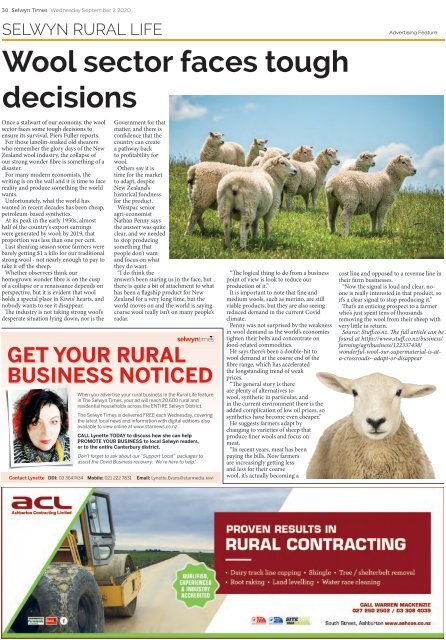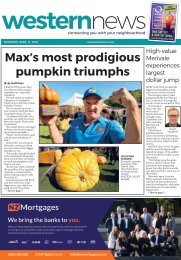Selwyn Times: September 02, 2020
Create successful ePaper yourself
Turn your PDF publications into a flip-book with our unique Google optimized e-Paper software.
30 <strong>Selwyn</strong> <strong>Times</strong> Wednesday <strong>September</strong> 2 2<strong>02</strong>0<br />
SELWYN RURAL LIFE<br />
Wool sector faces tough<br />
decisions<br />
Once a stalwart of our economy, the wool<br />
sector faces some tough decisions to<br />
ensure its survival. Piers Fuller reports.<br />
For those lanolin-soaked old shearers<br />
who remember the glory days of the New<br />
Zealand wool industry, the collapse of<br />
our strong wonder fibre is something of a<br />
disaster.<br />
For many modern economists, the<br />
writing is on the wall and it is time to face<br />
reality and produce something the world<br />
wants.<br />
Unfortunately, what the world has<br />
wanted in recent decades has been cheap,<br />
petroleum-based synthetics.<br />
At its peak in the early 1950s, almost<br />
half of the country’s export earnings<br />
were generated by wool; by 2019, that<br />
proportion was less than one per cent.<br />
Last shearing season some farmers were<br />
barely getting $1 a kilo for our traditional<br />
strong wool - not nearly enough to pay to<br />
take it off the sheep.<br />
Whether observers think our<br />
homegrown wonder fibre is on the cusp<br />
of a collapse or a renaissance depends on<br />
perspective, but it is evident that wool<br />
holds a special place in Kiwis’ hearts, and<br />
nobody wants to see it disappear.<br />
The industry is not taking strong wool’s<br />
desperate situation lying down, nor is the<br />
Government for that<br />
matter, and there is<br />
confidence that the<br />
country can create<br />
a pathway back<br />
to profitability for<br />
wool.<br />
Others say it is<br />
time for the market<br />
to adapt, despite<br />
New Zealand’s<br />
historical fondness<br />
for the product.<br />
Westpac senior<br />
agri-economist<br />
Nathan Penny says<br />
the answer was quite<br />
clear, and we needed<br />
to stop producing<br />
something that<br />
people don’t want<br />
and focus on what<br />
they do want.<br />
“I do think the<br />
answer’s been staring us in the face, but<br />
there is quite a bit of attachment to what<br />
has been a flagship product for New<br />
Zealand for a very long time, but the<br />
world moves on and the world is saying<br />
coarse wool really isn’t on many people’s<br />
radar.<br />
GET YOUR RURAL<br />
BUSINESS NOTICED<br />
When you advertise your rural business in the Rural Life feature<br />
in The <strong>Selwyn</strong> <strong>Times</strong>, your ad will reach 20,600 rural and<br />
residential households across the ENTIRE <strong>Selwyn</strong> District.<br />
The <strong>Selwyn</strong> <strong>Times</strong> is delivered FREE each Wednesday, covering<br />
the latest local news and information with digital editions also<br />
available to view online at www.starnews.co.nz.<br />
CALL Lynette TODAY to discuss how she can help<br />
PROMOTE YOUR BUSINESS to local <strong>Selwyn</strong> readers,<br />
or to the entire Canterbury district.<br />
Don’t forget to ask about our “Support Local” packages to<br />
assist the Covid Business recovery. We’re here to help!<br />
Contact Lynette DDI: 03 3647434 Mobile: <strong>02</strong>1 222 7831 Email: Lynette.Evans@starmedia.kiwi<br />
“The logical thing to do from a business<br />
point of view is look to reduce our<br />
production of it.”<br />
It is important to note that fine and<br />
medium wools, such as merino, are still<br />
viable products, but they are also seeing<br />
reduced demand in the current Covid<br />
climate.<br />
Penny was not surprised by the weakness<br />
in wool demand as the world’s economies<br />
tighten their belts and concentrate on<br />
food-related commodities.<br />
He says there’s been a double-hit to<br />
wool demand at the coarse end of the<br />
fibre range, which has accelerated<br />
the longstanding trend of weak<br />
prices.<br />
“The general story is there<br />
are plenty of alternatives to<br />
wool, synthetic in particular, and<br />
in the current environment there is the<br />
added complication of low oil prices, so<br />
synthetics have become even cheaper.”<br />
He suggests farmers adapt by<br />
changing to varieties of sheep that<br />
produce finer wools and focus on<br />
meat.<br />
“In recent years, meat has been<br />
paying the bills. Now farmers<br />
are increasingly getting less<br />
and less for their coarse<br />
wool, it’s actually becoming a<br />
cost line and opposed to a revenue line in<br />
their farm businesses.<br />
“Now the signal is loud and clear, noone<br />
is really interested in that product, so<br />
it’s a clear signal to stop producing it.”<br />
That’s an enticing prospect to a farmer<br />
who’s just spent tens of thousands<br />
removing the wool from their sheep with<br />
very little in return.<br />
Source: Stuff.co.nz. The full article can be<br />
found at https://www.stuff.co.nz/business/<br />
farming/agribusiness/122337438/<br />
wonderful-wool-our-supermaterial-is-ata-crossroads--adapt-or-disappear


















